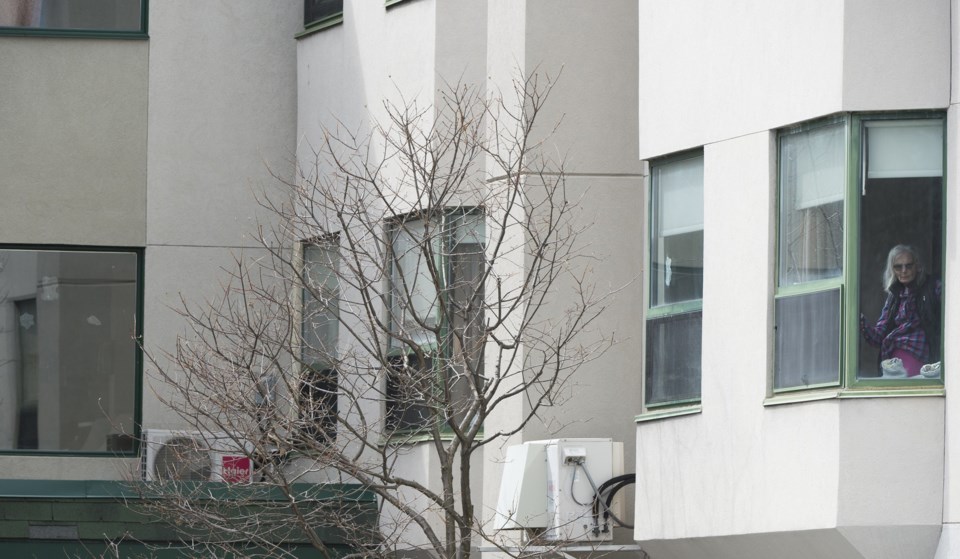Grandparents have been waiting for months for public health officials to relax restrictions on visits from their grandchildren during the COVID-19 pandemic.
They'll have to wait a little longer before that can safely happen.
As society slowly begins to reopen and provinces introduce new rules for family gatherings, health experts say now's not the time to start visiting our most at-risk sector of the population.
"The concern with grandparents is that we know that older people are more vulnerable to having severe outcomes with COVID-19," said Ashleigh Tuite, an epidemiologist at the University of Toronto's Dalla Lana School of Public Health.
"So although in the community the overall risk of transmission may be relatively low, we're going to want to be abundantly cautious when it comes to interacting with vulnerable people like our grandparents."
While Canada is reporting overall downward trends when it comes to new COVID-19 cases, Ontario saw a slight jump last week before numbers started going down again.
Tuite says that's evidence that the pandemic is still in its first wave, at least in Ontario, and residents there will need to take a more cautious approach.
But even in other provinces, like New Brunswick and Newfoundland and Labrador, which have recently introduced two-household bubbles, Tuite urges people to be "aware of the risk" in including grandparents in their social circles and minimizing it whenever possible.
"We know the risk of transmission indoors is higher than outdoors. ... So if you could meet outside, that would be ideal. And again, keeping our distance," Tuite said. "I know that can be really, really hard, particularly with grandparents and grandchildren not being able to hug. So you have to make a calculated risk assessment.
"In different locations that haven't seen cases in weeks, you might be a little bit more comfortable interacting with grandparents than in the (Greater Toronto Area) where we know that there's still significant community transmission happening."
Dr. Robert Madan, the chief of psychiatry at Baycrest Health Sciences, a research hospital for the elderly in Toronto, says older adults can be profoundly impacted by social isolation measures.
And dealing with that isolation as the pandemic lingers has been increasingly difficult for some.
"In the first couple of weeks, people were able to rally and thought this will be short lived. But then as time goes on, they're feeling more and more isolated and it becomes a stressor," he said. "And in terms of being a grandparent, that's a significant role for a person.
"It provides meaning to people's lives and joy and occupation. And when that's taken away, it has a very big impact."
Madan says older people can also be more prone to loneliness.
Some lose a significant social circle once they retire, and death and illness can cut down other friend groups as people age.
Anastasia Assuras, a registered psychotherapist in Toronto, says being a grandparent can also provide a sense of structure in the lives of older adults.
So missing the social connection they get from regular visits form grandchildren can be tough to handle.
"Those visits can normally be so helpful for their motivation and their general self-care. ... So taking that away, it must be creating some depression-like symptoms and perhaps some anxiety," Assuras said. "We're kind of left to our own devices and without that structure, without being able to look forward to that (visit), it can be quite sad."
Madan says regular virtual visits, rather than in-person, can help — for those who have the technological capabilities, at least.
He said Baycrest has been facilitating virtual group therapy sessions and "e-visits" for patients and their families using iPads, and even he was surprised at how well older adults have responded to the technology.
"They're finding that there is a whole world out there, and it's been great to see," he said. "(They are) connecting with people and developing new social groups to reduce isolation, and it has a positive impact, absolutely."
Not being able to figure out technology can cause frustration for some older adults, however, and Assuras said that could lead to anger and a need for an outlet to express that.
Assuras says simple phone calls can be generally helpful for those unable to video chat, and dropping off groceries or gifts is another way to ensure grandparents don't feel forgotten.
Tuite encourages those types of "creative ways" to interact, at least until the COVID threat declines enough to allow in-person visits.
"I understand that it can be really, really hard right now, given that desire to see people who we haven't seen for a long period of time," she said.
"But if we want to start returning to normalcy, we're going to have to stick with this for a little bit longer."
This report by The Canadian Press was first published May 28, 2020.
Melissa Couto, The Canadian Press



